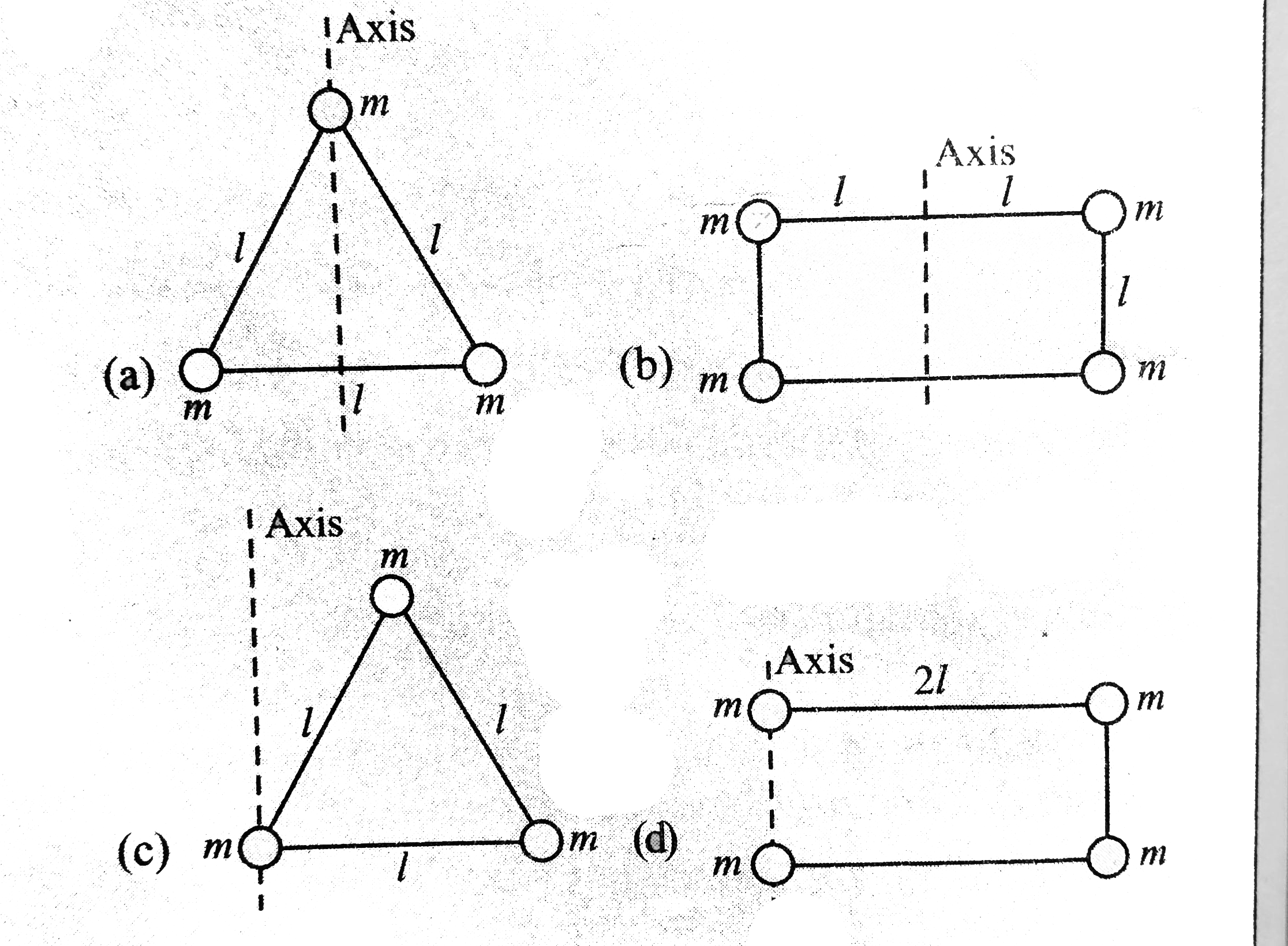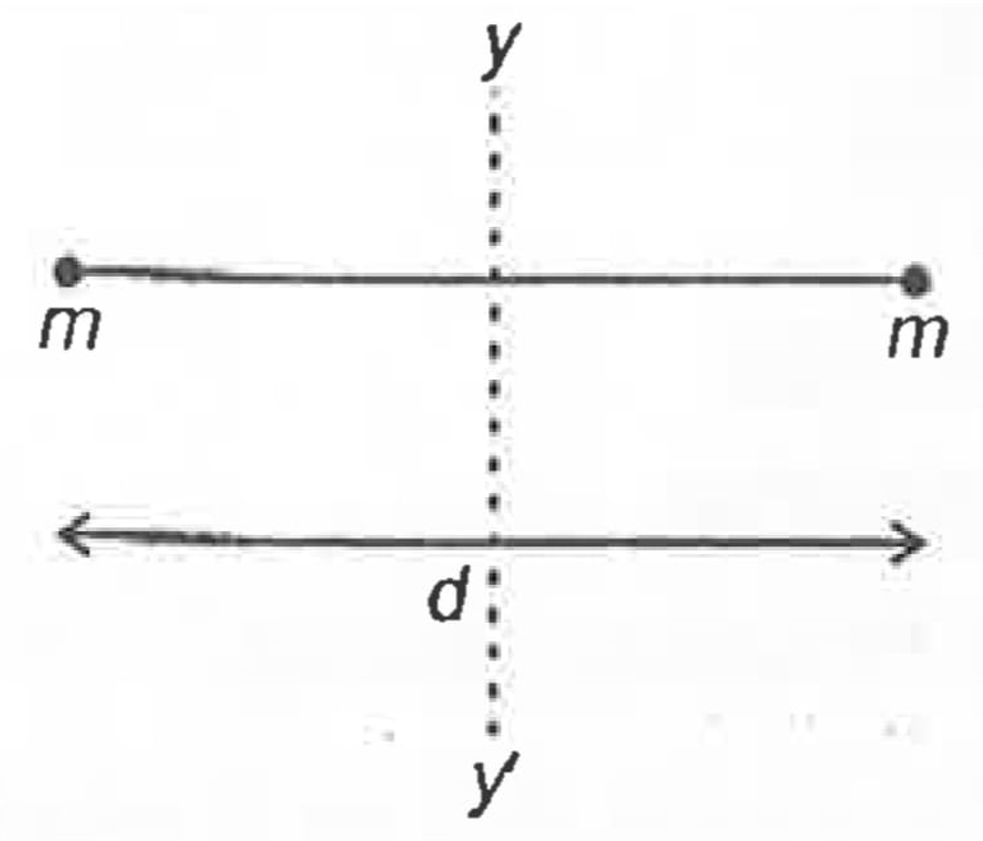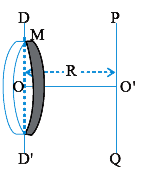If a large number of particles are distributed on YZ plane and their centre of mass is at origin of coordinates, then
Sum of moments of masses of all particles about the origin is zero
Sum of momentum of masses of all particles w.r.t. the origin is zero
Sum of moments of masses of all particles about Y axis is zero.
Sum of moments of masses of all particles about Z axis is zero.
Sum of moments of masses of all particles about the origin is zero
Sum of momentum of masses of all particles w.r.t. the origin is zero
Sum of moments of masses of all particles about Y axis is zero.
Sum of moments of masses of all particles about Z axis is zero.
The correct Answer is:B
To solve the question, we need to analyze the implications of having a large number of particles distributed in the YZ plane with their center of mass at the origin. Let's break down the options one by one.
1. Understanding the Center of Mass:
The center of mass (CM) of a system of particles is given by the formula:
→RCM=m1→r1+m2→r2+m3→r3+…+mn→rnm1+m2+m3+…+mn
Given that the center of mass is at the origin, we have:
m1→r1+m2→r2+m3→r3+…+mn→rn=0
2. Option A: Sum of moments of masses about the origin:
The moment of mass about the origin is given by:
IO=m1r21+m2r22+m3r23+…+mnr2n
Since r2i (the square of the distance from the origin) is always positive for non-zero masses, the sum cannot be zero. Therefore, Option A is incorrect.
3. Option B: Sum of momentum of masses w.r.t. the origin:
The total momentum →P of the system is given by:
→P=m1→v1+m2→v2+m3→v3+…+mn→vn
If the center of mass is at the origin, the sum of the momenta of the particles must also sum to zero. Therefore, Option B is correct.
4. Option C: Sum of moments of masses about the Y-axis:
The moment of mass about the Y-axis is given by:
IY=m1z21+m2z22+m3z23+…+mnz2n
Since z2i is always positive, the sum cannot be zero. Therefore, Option C is incorrect.
5. Option D: Sum of moments of masses about the Z-axis:
Similarly, the moment of mass about the Z-axis is given by:
IZ=m1y21+m2y22+m3y23+…+mny2n
Since y2i is always positive, the sum cannot be zero. Therefore, Option D is incorrect.
Final Conclusion:
The only correct statement is Option B: "Sum of momentum of masses of all particles w.r.t. the origin is zero."
The center of mass (CM) of a system of particles is given by the formula:
→RCM=m1→r1+m2→r2+m3→r3+…+mn→rnm1+m2+m3+…+mn
Given that the center of mass is at the origin, we have:
m1→r1+m2→r2+m3→r3+…+mn→rn=0
The moment of mass about the origin is given by:
IO=m1r21+m2r22+m3r23+…+mnr2n
Since r2i (the square of the distance from the origin) is always positive for non-zero masses, the sum cannot be zero. Therefore, Option A is incorrect.
The total momentum →P of the system is given by:
→P=m1→v1+m2→v2+m3→v3+…+mn→vn
If the center of mass is at the origin, the sum of the momenta of the particles must also sum to zero. Therefore, Option B is correct.
The moment of mass about the Y-axis is given by:
IY=m1z21+m2z22+m3z23+…+mnz2n
Since z2i is always positive, the sum cannot be zero. Therefore, Option C is incorrect.
Similarly, the moment of mass about the Z-axis is given by:
IZ=m1y21+m2y22+m3y23+…+mny2n
Since y2i is always positive, the sum cannot be zero. Therefore, Option D is incorrect.
The only correct statement is Option B: "Sum of momentum of masses of all particles w.r.t. the origin is zero."
Topper's Solved these Questions
- SYSTEM OF PARTICLES AND ROTATIONAL MOTIONBOOK - AAKASH INSTITUTE ENGLISHCHAPTER - SYSTEM OF PARTICLES AND ROTATIONAL MOTIONEXERCISE - Assignment (Section - D) Linked Comprehension Type Questions
20 Videos
- SYSTEM OF PARTICLES AND ROTATIONAL MOTIONBOOK - AAKASH INSTITUTE ENGLISHCHAPTER - SYSTEM OF PARTICLES AND ROTATIONAL MOTIONEXERCISE - Assignment (Section - E) Assertion-Reason Type Questions
12 Videos
- SYSTEM OF PARTICLES AND ROTATIONAL MOTIONBOOK - AAKASH INSTITUTE ENGLISHCHAPTER - SYSTEM OF PARTICLES AND ROTATIONAL MOTIONEXERCISE - Assignment (Section - B) Objective Type Questions (One option is correct)
60 Videos
- SEMICONDUCTOR ELECTRONICS: MATERIALS, DEVICES AND SIMPLE CIRCUITSBOOK - AAKASH INSTITUTE ENGLISHCHAPTER - SEMICONDUCTOR ELECTRONICS: MATERIALS, DEVICES AND SIMPLE CIRCUITSEXERCISE - Assignment (Section-D (Assertion and reason))
5 Videos
- TEST 1BOOK - AAKASH INSTITUTE ENGLISHCHAPTER - TEST 1EXERCISE - EXERCISE
21 Videos
Similar Questions
If a large number of particles are distributed on YZ plane and their centre of mass is at origin of coordinates, then
Sum of moments of masses of all particles about the origin is zero
Sum of momentum of masses of all particles w.r.t. the origin is zero
Sum of moments of masses of all particles about Y axis is zero.
Sum of moments of masses of all particles about Z axis is zero.
View SolutionIf large number of particles are distributed on XY plane and their centre of mass is at origin of coordinates, then
View SolutionThe centre of mass of a system of particles is at the origin. It follows that:
View SolutionCalculate the moment of inertia of each particle in Fig. about the indicated axis of rotation.

View Solutionfind moment of inertia about an axis yy which passes through the centre of mass of the two particle system as shown

View SolutionA particle of mass 1 kg is kept at (1m,1m,1m). The moment of inertia of this particle about Z-axis would be
View SolutionIf all the particle of a system lie in X-Y plane is it necessary that the centre of mass be in X-Y plane?
View SolutionThe moment of inertia of a ring of mass M and radius R about PQ axis will be

View SolutionA large number of particles are placed around the origin, each at a distance R from the origin. The distance of the center of mass of the system from the origin is
View SolutionAll the particles of a body situated at distance R from the origin. The distance of the center of mass of the body from the origin is
View Solution
